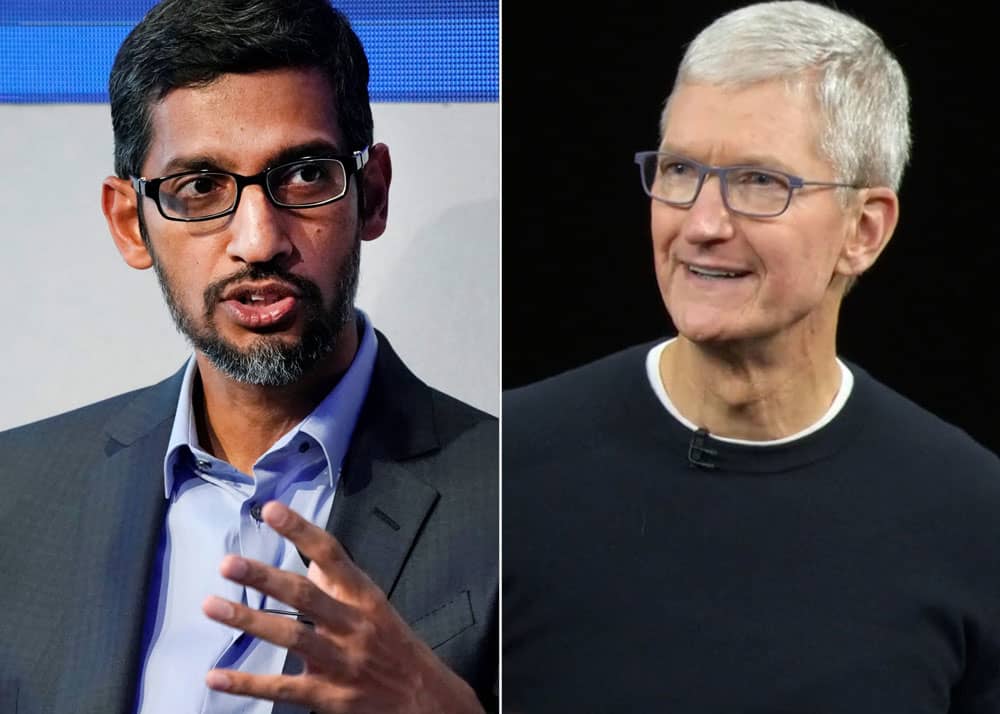
Sundar Pichai and Tim Cook
Source: Reuters; Apple
The Senate Judiciary Committee passed its second tech competition bill of the year Thursday, this time targeting Apple and Google’s mobile app stores and their restrictions on developers.
The committee voted to advance the bipartisan Open App Markets Act 20-2, with Sen. John Cornyn, R-Texas, and Sen. Thom Tillis, R-N.C., serving as the only no votes. Last month, the panel also voted to advance the American Innovation and Choice Online Act, which would accomplish some of the same goals but impact a greater swath of tech companies by preventing dominant firms from unfairly ranking their own products above others or discriminating against rivals.
The passage of the two bills out of committee shows the broad appetite in Congress to advance legislation targeting the Big Tech companies. The bill’s broad support is also a promising sign for its sponsors. The more sweeping American Innovation and Choice Online Act saw six Republicans vote against its advancement.
The bill would make it so app stores with more than 50 million U.S. users cannot require developers to use the platform’s payment system as a condition for distribution. They also can’t prevent or punish developers for offering their apps at different price points elsewhere. It would additionally require the app stores to allow developers to directly reach their users for legitimate business purposes.
The Open App Markets Act notably picked up the support of Sen. Mike Lee, R-Utah, the ranking member on the antitrust subcommittee who voted against advancing the earlier legislation. Lee still said he hoped to work with the bill’s sponsors to amend it further.
The Open App Markets Act, spearheaded by Sens. Richard Blumenthal, D-Conn., and Marsha Blackburn, R-Tenn., the chair and ranking member of subcommittee on consumer protection, seeks to require dominant app stores to make it easier for developers to distribute their apps and connect with their customers.
The legislation addresses key gripes app developers including Spotify, Epic Games, BaseCamp and others have raised about Apple and Google’s fees for distribution and prohibitions on the ways in which they can communicate with customers or offer lower prices elsewhere.
The app store operators have opposed the bill as originally drafted, warning it could jeopardize consumer privacy and result in a worse user experience.
“This bill could destroy many consumer benefits that current payment systems provide and distort competition by exempting gaming platforms, which amounts to Congress trying to artificially pick winners and losers in a highly competitive marketplace,” Google VP of Government Affairs and Public Policy Mark Isakowitz said in a statement ahead of the markup.
In a letter to Judiciary Committee leaders obtained by CNBC, Apple Senior Director of Government Affairs in the Americas Timothy Powderly wrote, “We are deeply concerned that the legislation, unless amended, would make it easier for big social media platforms to avoid the pro-consumer practices of Apple’s App Store, and allow them to continue business as usual. It does so by mandating that Apple allow the sideloading of apps and app stores that need not comply with the App Store’s pro-consumer privacy protections.”
Members on both sides of the aisle raised concerns about how the bill would impact consumer privacy and security. The committee adopted a manager’s amendment at the beginning of the markup that makes more clear the types of security considerations app stores can take that would not violate the law. Some members said they hoped the bill’s sponsors would continue working with them on further updates.
Sen. Amy Klobuchar, D-Minn., the chair of the antitrust subcommittee who supports the legislation, said the bill’s crafters had spoken with consumer advocates and cybersecurity experts who disagreed with the tech companies that the bill would jeopardize user privacy.
Like the American Innovation and Choice Online Act, this bill saw some pushback from the two Democratic senators from California on the committee, Sens., Dianne Feinstein and Alex Padilla. Feinstein said she worried that the bill was constructed to target companies based in her state while Padilla raised concerns that some of the bill’s language could make it harder for app stores to down-rank apps for hate speech. They both ultimately voted to advance the bill.
WATCH: Senators Blackburn and Blumenthal discuss the Open App Markets Act




